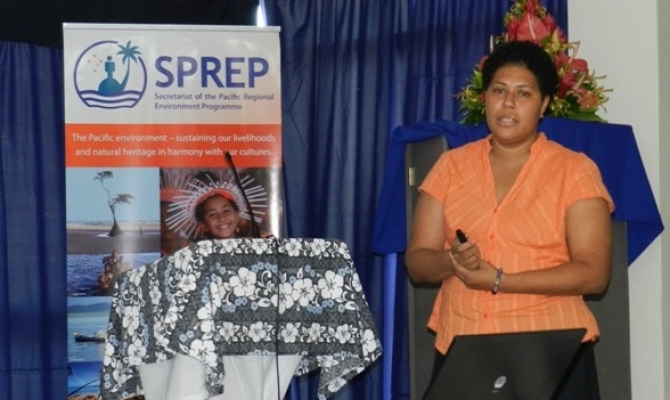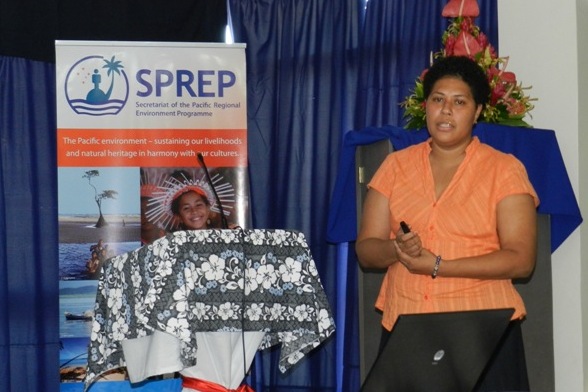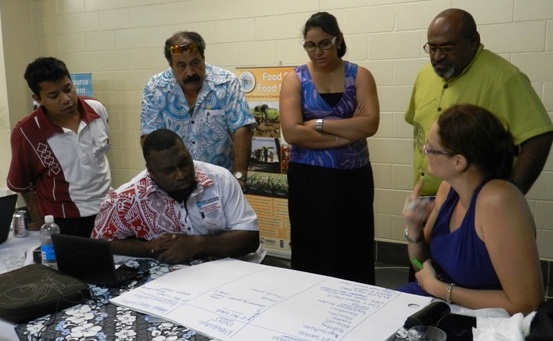
2 March 2012, Apia, Samoa -- Accessing funds for Climate Change adaptation is a key challenge for the Pacific as knowing where to seek information on the financing available and how to access the funds is not always as cut and dried as it seems.
In Apia this week a two day meeting coordinated by the Secretariat of the Pacific Regional Environment Programme (SPREP) and the Asia Pacific Adaptation Network, identified obstacles faced by countries in accessing adaptation financing with a special session. The discussions will help pave a way forward that will help address these barriers.
Fiji Environment Officer to the Department of Environment, Ms Alisi Vosalevu said that some of the challenges faced were countries not having the capacity to access funds, the skills to formulate proposals and meet the requirement of finance institutions within their deadlines.
"We want money to come directly from the donors to the countries as direct budgetary support, but most of the countries do not have the necessary capacity so the option for getting a National Implementing Entity (NIE) to be responsible for that is hampered by the requirements to its establishment, which are hard to fulfill."
Niue Pacific Adaptation to Climate Change Coordinator Mr. Haden Talagi shared similar challenges.
"We do not have the capacity to continuously follow through proposals right to the end as these proposals are often knocked back by donors or agencies for further refinements, and the guidelines and criteria in preparing proposals are often unclear and challenging," he said.
The Cook Islands are in the process of setting up a Disaster Risk Management (DRR) -Climate Change Adaptation (CCA) Trust Fund to pool, manage and distribute funding for disaster risk reduction and climate change adaptation activities in the Cook Islands.
"The Trust Fund will serve as a mechanism to facilitate direct access to national, regional and international funds for DRR and CCA. Some of the challenges rest with identifying the source of funding to establish the Trust Fund and identifying further funding to grow the Trust Fund," said Mr. Charles Carlson Director Emergency Management Cook Islands.
Capacity development trainings were a dominant recommendation put forth by country representatives in tackling some of the challenges and better understanding donor requirements, and to work with the regional organisations to make the most efficient use of funds.
"The recommendations are very practical, some of the training identified, for example building capacities of the policy makers and the National Implementing Entity it's something that APAN can undertake along with the ADAPT Project," said Dr Puja Sawhney, the Coordinator of the Regional Hub for Asia Pacific Adaptation Network, Institute for Global Environment Strategies.
"ADAPT is a USAID Project that goes to different countries and conducts week-long capacity building exercises in writing tangible proposals. We, SPREP and APAN, are planning to have an annual sub regional conference and the countries will have the opportunity to talk about their national needs and priorities in the region, and provide them an opportunity where they can meet with the donors – these are two things that I can mention on the outset that would be some of the recommendations we are looking at to address the challenges put forth by countries."
Countries represented at the meeting included Fiji, Niue, Cook Islands, Vanuatu, Samoa, Kiribati, Palau and Republic of the Marshall Islands. The meeting was held on the 28th and 29th of February 2010.

